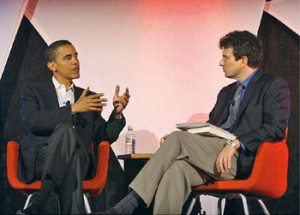Fetishizing the form’: on the importance of word counts
Last week, The New Yorker published a 17,000-word piece on Barack Obama by editor David Remnick. I haven’t read the feature yet, so I don’t know much about it, but I know how long it is because:
- Gawker noted it in a story about quote approval.
- So did the Washington Post.
- So did The Wire
- So did other people.
- In a 45-minute interview with WNYC’s Brian Lehrer, the author and the host mentioned the word count several times.
What little I do know of the story indicates that it is similar to Michael Lewis’s feature on Obama in the October 2012 Vanity Fair. Just as Remnick’s piece has been heralded for being long, so was Lewis’s for how long it took. “Hanging around Barack Obama for six months, in the White House, aboard Air Force One, and on the basketball court…” read part of the deck on Lewis’s story. Before anyone got the chance to read it, writers dutifully noted this access: see CNBC, NPR, Daily Kos and Business Insider (who called Lewis’s access “the coolest thing” about his story).
North of the border, when The Globe and Mail finally rolled out its investigation into Doug Ford’s teenage years, editor-in-chief John Stackhouse noted that the reporters had spent 18 months on the story. (The time span was also mentioned in the article itself.)
This intense attention to everything about a story except its quality is part of a trend that New York Times Magazine writer Jonathan Mahler recently called “fetishizing the form.” Mahler wrote that this obsession over word count was partly responsible for the initial praise (followed by torrent of criticism) heaped on Grantland’s troubling story, “Dr. V’s Magical Putter.”
Mahler wrote that a long-form story’s goal “should be to understand and illuminate its subject, and maybe even use that subject to (subtly) explore some larger, more universal truths. Above all, that requires empathy, the real hallmark of great immersive journalism.”
He’s right that “Dr. V’s Magical Putter” lacked anything even remotely resembling empathy—one of many problems with it, as Christina Kahrl explained—and while it is certainly the most egregious example, it’s sadly not the only story to be praised more for its making than for its success in exploring universal truths. It’s like saying you enjoy Double Bubble because you watched a segment on How It’s Made.
This isn’t to say, as some have suggested, that the term “long-form” be jettisoned in favour of a different label. But it’s a poor criterion for judging a piece of journalism.
Remember to follow the Review and its masthead on Twitter. Email the blog editor here.















